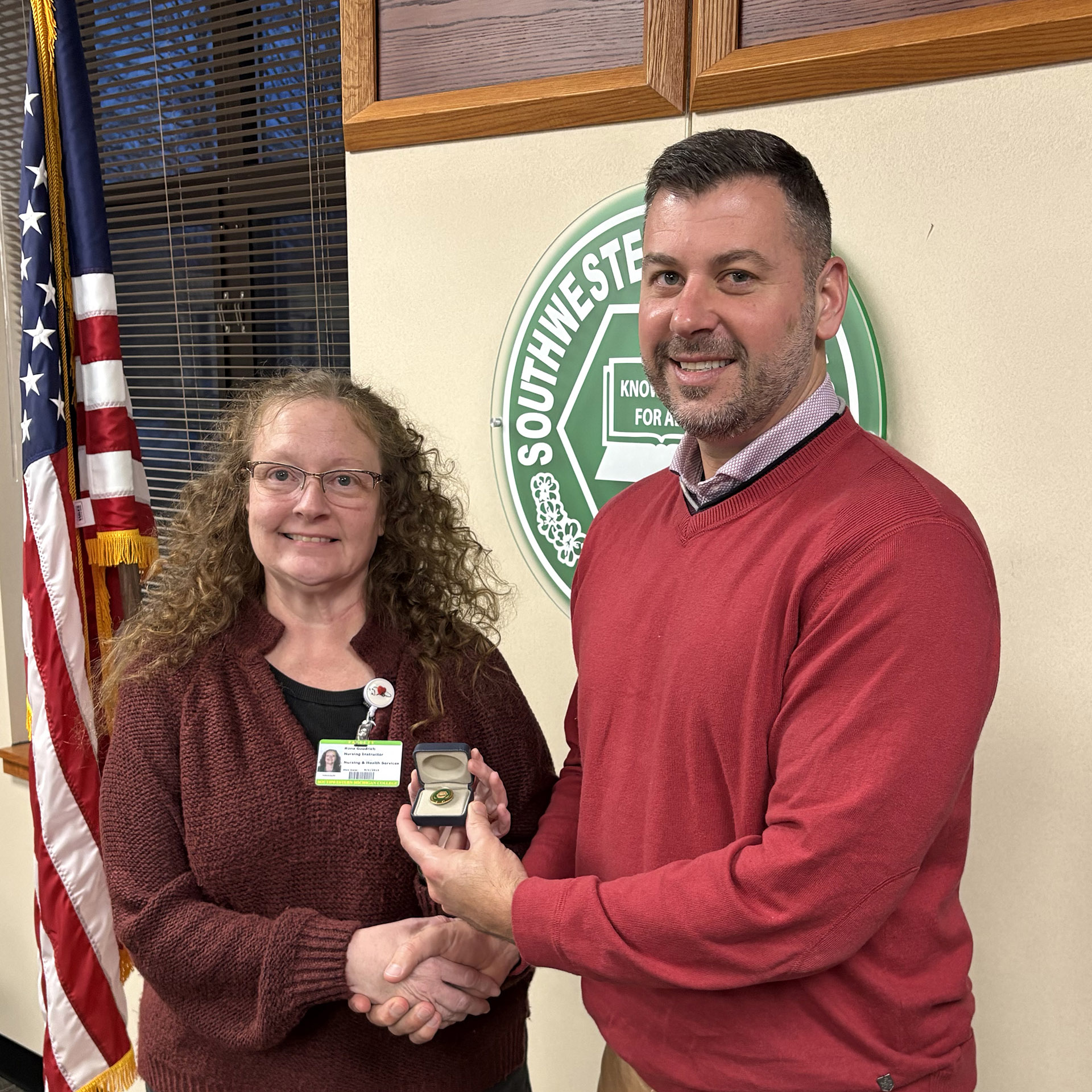
News
SMC Bass Anglers Eye Move into the Top 25
Published on December 21, 2023 - 12 p.m.
Southwestern Michigan College’s bass fishing team finished its inaugural Association of Collegiate Anglers (ACA) season in May a phenomenal 29th in the nation.
Hundreds of colleges send teams to events all over the country.
During their first year of competition, SMC Bass Anglers fished tournaments in eight different states.
“We finished 29th without being able to fish with the incoming freshmen until September,” Roadrunners Coach Bill Mathews said. “This will be our first full season. We have 22 on the team for this upcoming year,” including two women. “We have eight sophomores and 14 incoming freshmen. My goal this year is to be in the top 25.”
“They just did the preseason rankings,” Mathews said, “and we weren’t in the top 25, so I feel like that will be a little chip on our shoulder. Since we’re a relatively new team, I think a lot of people don’t know who we are.”
“Montevallo (Alabama’s University of Montevallo) has been a huge force in collegiate fishing for the last few years,” Mathews said. “They have a huge team with 50+ anglers, and they send a lot of boats. We’re sending three, four boats to an event because it usually works out to the top two for points. If you send four boats and two do really well, it’s good School of the Year points. They’re sending 10, 15, 20 boats to some of these tournaments, so they’re bound to have two that do pretty well.”
The ACA is one of three major tournament trails; it keeps track of overall School of the Year points. “MLF (Major League Fishing) has its own ranking,” said Mathews. “Right now, we’re in ninth place for their tournaments. Bassmaster doesn’t really do a School of the Year race, but their national championship is the most important to college anglers because it gives them a chance at the College Bassmaster National Championship, which is the Super Bowl of bass fishing. We ended up 21st .”
That August event brought together 132 teams from 56 colleges and universities in 24 states at Pickwick Lake.
A reservoir created as part of the Tennessee Valley Authority, the lake is one of the few in the United States straddling three states, Tennessee, Alabama and Mississippi. The Roadrunners launched from Tennessee.
A unique sport
“College fishing is a unique sport,” Mathews said. “The size of your school is not a major factor. Two-year schools such as SMC are able to compete on the same playing field as powerhouse four-year schools with more than 40,000 students enrolled.”
“A huge draw”
“A college fishing team and the college supporting the team has been huge,” Mathews said. “High school fishing has exploded. The high school championship was the biggest it’s ever been, with some 480 teams. There’s a ton of high school anglers looking for a place to continue on and to fish in college,” as near as Three Rivers, which launched high school and middle school teams.
“SMC being able to offer extremely affordable tuition, but still get the same experience as at one of the big fishing schools, has been a huge draw. We’ve had quite a few come to us from Illinois, which was the first state to start it as a high school sport, even before Southern schools. There’s quite a few big programs on the east side of Michigan, the Detroit area, Midland, Grand Rapids and Indiana.”
Students drawn to SMC by the chance to fish collegiately are majoring in business to work in the fishing industry and the trades, especially construction and welding. But a couple are pursuing nursing, too.
Mathews, an admissions counselor from Illinois who graduated from SMC with honors in 2017, studied marketing at Grand Valley State University, which ranked nationally his two years there.
After Grand Valley, he ran his YouTube channel fulltime for about two years, amassing 44,000 subscribers and more than 8 million views for fishing videos. He knows fishing and what it takes to win.
Skill makes luck
SMC Bass Anglers’ primary targets in fishing tournaments are smallmouth, largemouth and spotted bass.
“They all act pretty differently from each other,” according to Mathews.
“Largemouth tend to gravitate toward shallow cover. They’re kind of opportunistic feeders. They like to hunker down and sit in one spot. Guys with big rods and heavy line flip into thick cover. Shallow-water anglers are typically going to be largemouth anglers. They have excelled by learning the new electronics.”
Smallmouth “like to move around and chase bait fish,” Mathews said. “They’re nomadic and like to cruise. Smallmouth are deeper, so if we’re at a smallmouth-based lake, I know who my good smallmouth anglers are who excel in deep fishing and really read graphs well.
“Spotted bass are similar to smallmouth bass,” he said. “They are known to be very nomadic and prefer deeper water. They are the most likely of the three species to be suspended in the water column.”
Then there are the variables of season and weather.
“A lake’s going to fish differently in the spring than the dead of summer,” Mathews said. “In the spring, a lot of the fish are more shallow, so it’s lots of power fishing. It gets hot in the summer, especially in the South, so a lot of those fish are out deep and don’t want to move around as much. It varies, so you have to send the best angler for the job.
“People who don’t know much about fishing and haven’t followed professional tournament fishing think about sitting on the bank with bobbers and (the adage) ‘a good day of fishing is a day a fish happens to bite your line and a bad day of fishing is every other day.’ But it’s reading different conditions. Weather patterns affect how the fish set up. If it’s cloudy, fish are more apt to be cruising shallow flats. If it’s sunny, they stick to heavier cover. Fish don’t have eyelids, so they don’t like sitting in two feet of water with the sun beating down on them. They’ll go find a nice, shady dock to sit underneath. You have to read the conditions and adapt because every single day on the water is completely different.”
“Usually, they have two or three days to fish the lake and pick it apart,” he said. “They can try all sorts of tactics — shallow, deep, moving baits, slower baits — and identify key spots where they think they might be able to win the tournament. In practice, you don’t want to catch all the bass, so you leave enough for the actual tournament.”
Weather famously changes constantly. “That’s one of the keys,” Mathews said. “The best anglers are able to adjust. It might be sunny, calm and 90 degrees for practice, then the temperature drops 30 degrees on tournament day and the wind’s blowing rain sideways.”
“Lake of the Ozarks was tough for us this year. I know everyone has the same conditions,” Mathews said, “but the temperature dropped significantly overnight and so did the water temperature, though not quite as quickly.”
A broken boat can win
In the annals of SMC angling, June 4 will be remembered for generating a Midland Daily News headline — Local Anglers Win Their First College Fishing Tournament with a Broken Boat.
Elijah Jaimie and Avery Merrow hauled in collectively more than 20 pounds of fish — a bag that landed them at least in the top five.
As they drove their boat back 18-20 miles to the weighing station, the motor began making grinding noises.
Jaimie grew up fishing the Tittabawassee River, but his high school, Bay City Western, didn’t offer much in the way of competitive fishing, so he had been partnering with Merrow at Midland High School. He also met Jack Hay and Logan Ware. They all became SMC teammates, along with Cougar Fagan and Jack Romatz.
Romatz and Ware came to Jaimie’s and Merrow’s rescue when they were stranded in Torch Lake. Romatz stayed with Jaimie on the broken boat while Ware transported Merrow to weigh-in with his and Jaimie’s 21.33-lb., first-place catch.
“That’s one of the cool things about fishing,” Mathews said. “There’s a lot of camaraderie.”
A bass boat and its gadgets
When intercollegiate bass fishing arrived at SMC, a lot of locals familiar with dipping a line in one of the plentiful inland lakes from a rowboat dropped their jaws at state-of-the-art watercraft.
A brand-new, fully-rigged-out bass boat, 20 to 22 feet long with a 250-hp outboard motor, costs from $70,000 to $120,000.
“Obviously, you can get a used boat for a lot less than that,” Mathews said. “A lot of our guys running older boats do really well in tournaments.”
But electronics are hard to avoid.
“A lot of crazy technology is built into trolling motors these days,” Mathews explained. “Anglers typically have three screens, like little TVs, up front. It’s gotten to the point where you’ve got to be good at reading your electronics, knowing what you’re seeing and how best to utilize them because a lot of tournaments are being won now with forward-facing sonar (FFS). I think everyone on our team has it because it’s so hard to compete without it.”
FFS allows anglers to pan ahead of the boat, see fish and watch how they react to lures cast toward them.
A winning game plan
Fishing tournaments usually allow eight hours on the water, so from, say, 7 a.m. to 3 p.m., competitors try to land their five biggest fish.
There’s usually a minimum size requirement, typically 15 inches to be a “keeper,” but weight determines actual tournament scores.
“The number-one goal in any tournament is to get five in the box,” Mathews said. “It feels terrible when you leave one of your keeper slots on the table. At Lake of the Ozarks, with 170 boats, we got third place, and our team caught four.
“If they could have caught one more keeper — they lost the tournament by about a pound — it would have put them in first place. You always want five in the box to have all the slots filled, then the heaviest bass you can.”









